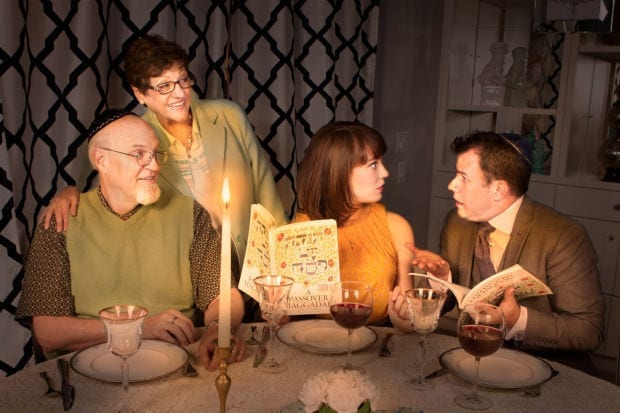OREM — One line of dialogue from the third act of James Sherman‘s Beau Jest perfectly summarizes the current production of the play at Hale Center Theater Orem: “You put on one hell of a performance.” Indeed, the superb acting and directing of the show combine to create one of the best non-musical productions ever at the Orem Hale.

Beau Jest is the charming story of Sarah Goldman, a kindergarten teacher who is reluctant to let her boyfriend meet her parents because he isn’t Jewish. Instead, she hires a man named Bob to pretend to be “David,” the ideal boyfriend (that is, wealthy, educated, and—most importantly—Jewish) for family get-togethers. However, the issue becomes more complicated as Sarah falls in love with non-Jewish Bob without telling her parents the truth or giving her previous boyfriend a sendoff. The producers at the Orem Hale hired two professional actors, Jenny Latimer and Blake Barlow, to play Sarah and Bob, and the two were ideally suited to their roles. Barlow displayed a sweet boy-next-door charm that contrasted well with Chris, Sarah’s other boyfriend (played by Cameron Bench). Barlow was also the perfect age for the role, which made him fit in well with Sarah’s lies about “David” being a single Jewish doctor. Latimer showed an irresistible charisma as Sarah, and I did not have trouble believing that two men would fall in love with her character. But Latimer’s best performance was in her character’s nervous moments, such as when Sarah realized that Bob wasn’t Jewish. In these times Latimer exaggerated Sarah’s high-strung personality just enough to get lots of laughs without becoming cartoony. Together Latimer and Barlow had excellent chemistry, and it was nice to watch Bob and Sarah slowly fall in love as the two spent more time together.

The supporting cast was similarly impressive in their performances. My favorite was Karen Baird as Miriam Goldman, Sarah’s mother. Baird exuded a gregarious Jewishness that was endearing without becoming stereotypical. The loving disagreements between Miriam and her husband Abe (played by Larson Holyoak) were simultaneously hilarious and endearing. Thanks to Baird’s and Holyoak’s performances, I quickly understood why Sarah loved her parents enough to create an elaborate web of lies to keep them happy. Shawn Lynn played the last member of the Goldman family and Sarah’s brother, Joel. The character is mostly on the sidelines during the play, but in the third act Lynn had an emotionally scene that showed Joel’s intellectual and familial strength. As enjoyable as the portrayals of the four Goldman family members are, this greatest cast’s asset is the way they work together as an ensemble. Every word felt like it had years of history behind it, and it was clear which topics were taboo among them or the ways that the characters would resolve conflicts (or not) in order to maintain unity and peace. In short, they felt like a family, and that was apparent in how they loved each other yet also got on one another’s nerves. Plus, they even bore a physical resemblance to one another. Laurie Harrop-Purser‘s direction is all about the details, and no action or intonation was too small to escape her notice. The fancy way Bob folded napkins, the routine of taking a family photograph, and the other little rituals of daily life throughout the play infused the show with a realism and familiarity. Harrop-Purser was also excellent in the way she steadily increased the humor in the first scene after the intermission; yet she also allowed the cast to pause to permit the audience to ruminate over the more serious, emotional moments of Sherman’s script. Bobby Swenson‘s set complemented the director’s love affair with detail, and the stage was so realistic decorated that in the intimate Hale Center Theater I felt like I was in Sarah’s living room. Likewise, Cody Swenson‘s lighting design had a subtle touch that changed colors slightly to help emphasize the characters’ moods, especially in the last act. The only aspect of the show that didn’t work for me was the modern costuming (by MaryAnn Hill), which didn’t work with talk of answering machines, pagers, and other technological relics of yesteryear. However, this is a minor complaint and the sort of thing that I would not have thought about much if I weren’t writing a review. I doubt most theatre patrons will mind the costuming. Beau Jest is a sweet story of family togetherness without a hint of the cynicism or irony that permeates too many family comedies in mainstream entertainment today. Harrop-Purser and her exquisite cast have created a wonderful show that will resonate with many audience members. It really is a “hell of a performance” [box type=”shadow”]Beau Jest plays nightly (except Sundays) at Hale Center Theater (225 W. 400 N., Orem) at 7:30 PM and Saturdays at 3 PM through September 20. Tickets are $14-22. For more information, visit www.haletheater.org.[/box]
